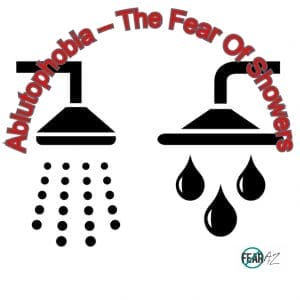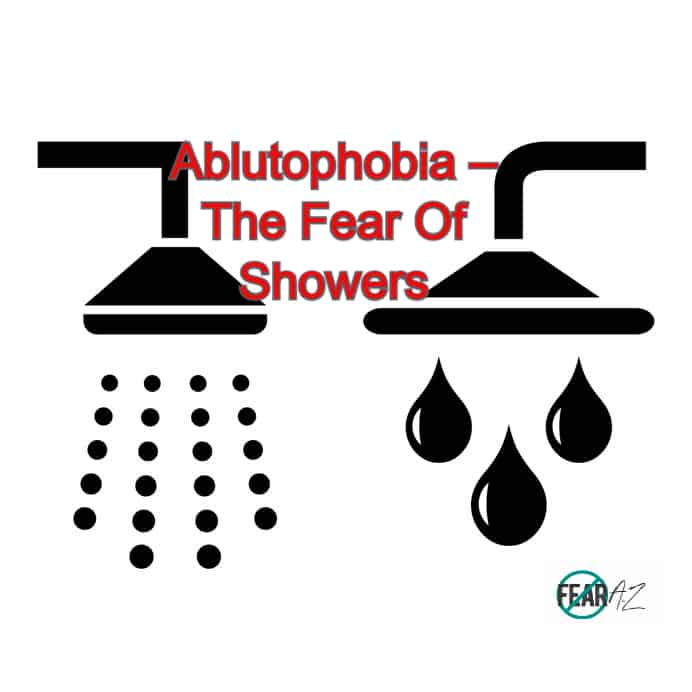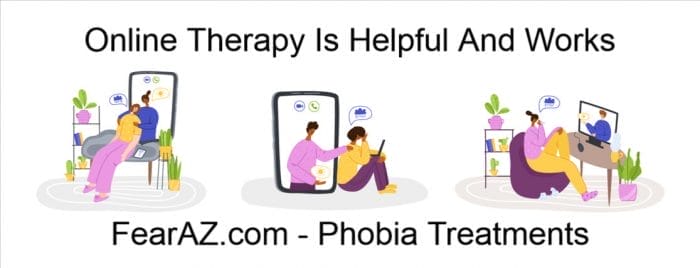Share This Article
The Fear of Showers-Bathing: Dirty Business
Are you confronted with fear and anxiety each time you take a shower?
Do you feel lightheaded at the thought? Does your heart race? Do you find yourself struggling to catch your breath at shower time?
Perhaps you’re more apt to wash up at the sink rather than step into a shower stall.
If you feel like this before each shower, you might have ablutophobia or the fear of taking a shower.
If you identify with this fear, there’s no need to worry. There are treatments to help end this struggle, but the first step is knowing why you have it and what triggers this fear.
You can control it; awareness and seeking help are the first steps.
What Causes the Fear of Showers or Bathing?
Ablutophobia or the fear of showering or bathing, like any other phobia, is rooted in a traumatic experience or past events. You may not experience such events consciously.
Although most phobias develop in individuals because of a negative event, they can also be caused by someone we know or even a character from books, movies, or TV shows. Some horror fans suffering from ablutophobia claim that the shower scene of the Alfred Hitchcock film Psycho caused their fear of showering.

Beyond that, this disorder can also result from secondhand fear passed on by a loved one or a relative who also has this phobia. It can be an internalized fear that the individual carries from childhood.
Ablutophobia is most common among children who have an aversion to bath time. It could be possible that this preference remains with them throughout adulthood.
What Is Ablutophobia All About?
You may remember how during childhood, showering felt like a chore after a fun day playing outside. But this phobia is about more than the tantrum you may have thrown when you were young.
Fear of showering, like any other phobia, is an anxiety disorder. Clinically, ablutophobia is known as a specific phobia. Healthcare providers will not quickly diagnose this phobia.
Although it is mainly a fear of showering or bathing, it could also be manifested in a complete aversion to all forms of washing.
Cleanliness is expected, especially in the modern world. Failing to shower regularly can cause one to smell unclean.
Aside from the personal implication to one’s health, the inability to shower can cause many problems, particularly social stigma.
This stigma can be a problem at school, work, and even in the person’s relationships. This isolation from loved ones and colleagues could cause further damage in their lives and put these individuals at a high risk of developing body image disorders.
Ablutophobia Symptoms
The symptoms of the phobia of fear of showering and bathing are similar to those of other phobias. These symptoms will manifest when a person living with the phobia is confronted with the act of showering or bathing.
- Anxiety and extreme fear when a person gets close to the situation of showering or bathing
- Panic attacks
- Acknowledgment that the fear is irrational but being unable to stop the anxiety
- Total or partial avoidance of showering and bathing; in some cases, avoidance of hand washing to avoid the fear is also seen
- The person’s life and daily activities are disrupted because of the phobia
- Sweating
- Difficulty in breathing
- Fast or rapid heartbeat
- When children have the aversion, they exhibit it by crying, clinging, and throwing tantrums
How to Deal with Ablutophobia
If someone you know is suffering with a fear of showers or bathing, encourage them to consult their healthcare professional.
Once the anxiety disorder is diagnosed, a mental health professional can provide therapy. A complete psychological evaluation will be done, including assessment of the patient’s social and family history, which will aid in the treatment of the phobia.
Dealing with the Phobia on Your Own
The fear of showering or bathing can take a toll not just on your relationships but also on your physical and mental health. Many who struggle with ablutophobia feel isolated, which can lead to anxiety and depression. But there are a things you can do on your own to alleviate it.
One thing that can be done is to gradually expose yourself to different degrees of your phobia.
For instance, in extreme cases, some are scared at the mere thought of hand washing. This can be harmful to one’s health, especially when it comes to warding off viral infections. Begin to tackle this fear gradually, by exposing yourself to hand washing.
Once you have gained some control of the fear, progress to showering or even bathing, but do so slowly and be patient with yourself. Don’t force the experience and don’t overexpose yourself to the fear.
A helpful way to manage your fear during this immersion is to employ deep breathing and be aware of what triggers the fear.
Some may have their fears activated just by watching movie scenes of people showering. Others can manage to shower quickly but get their phobia triggered at the mere thought of a bathtub. Learning what triggers your symptoms can help in the long run.
Treating the Fear of Showers
People who have this phobia might not seek treatment until their fear begins to pose a threat to their life. This might be because they don’t know effective treatments are available.
The first treatment type is called psychotherapy. This treatment plan includes exposure therapy and cognitive behavioral therapy.
In exposure therapy, as the name suggests, the person suffering from the affliction will be exposed to forms of washing and bathing. The person will learn to control their feelings of anxiety during each of the exposure sessions.
Cognitive behavioral therapy coupled with exposure therapy will equip you with techniques to change your perception about bathing and reduce your fear and anxiety.
These two treatment plans are still the most effective to manage the phobia and its symptoms; however, in some cases, medications might be prescribed together with psychotherapy.
Medication for fear of showering and bathing may include sedatives and beta-blockers. These medications do not treat the phobia itself, but rather help to relieve some of the physiological symptoms while you undergo therapy.
Besides psychotherapy, doctors will also recommend various lifestyle changes. You can incorporate lifestyle changes into your daily life to manage many of ablutophobia’s symptoms.
The first thing you can try is mindfulness exercises like meditation. Meditation involves breathing exercises and being mindful of your surroundings. These are known to help with panic attacks.
Speaking of deep breathing, getting into the habit of doing yoga, which promotes relaxation, could also be beneficial.
Other forms of exercise could help too. As studies have shown, the power of exercise helps the body manage stress and anxiety. Ablutophobia causes both stress and anxiety, so learning to handle these with mindfulness and exercise can significantly help when confronted with the phobia.
Learning to Cope with Ablutophobia
If you have a child suffering from the fear of showers
Children ages 1 to 2 are the population most likely to develop a fear of bath time. This is because at this age the brain is growing, and children are hyperaware of everything happening around them. Parents should not be worried as this aversion to water is highly unlikely to remain as they grow older.
Parents can do many things to combat this fear, from sponge baths to incorporating bath tub toys into their toddler’s bath. The child’s anxiety is rational at this age, so most parents won’t force their kids into a tub. During this time, a washcloth is often a parent’s friend at bath time.
Aside from using bath toys and other things to entice kids at bath time, parents can get in the tub with their children and join the fun. This helps your child understand that there is no reason to be afraid of bath time.
If you are suffering from the phobia
Phobias are anxiety disorders, and about 30 percent of Americans are afflicted with a type of phobia. You’re not alone in this discomfort. One of the most effective things you can do is to seek help as soon as possible. This will ensure the fear does not worsen. Treat it so you can be on your way to living everyday life as normally as possible.
Final Thoughts
Learn to cope with your fear of showers, because sometimes life’s pleasure is felt in something as simple as a warm shower after a hard day at work. Everyone deserves the experience.




